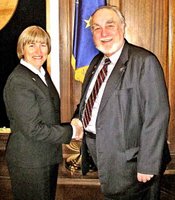The governor has called the legislature into special session. At long last, the governor has released what he has been calling the gas pipeline “contract.” Actually, it’s a proposed contract - but we have to start somewhere. A gas pipeline would be a bonanza for Alaska’s future generations, with billions of dollars to Alaska. I’ll do everything that I can to help bring an appropriate gas pipeline contract to fruition, and to bring Alaska's stranded gas to market.
Regretfully, it appears some legislators may be doing everything they can to kill the contract. Other legislators may want a gas contract - but not on this governor’s watch. It’s irresponsible. It’s politics at its worst. It’s not what we were elected for.
If we don’t like the contract, the responsible action is a good faith effort to fix it. Without doubt, ratification of the proposed contract presents significant legislative challenges (in my vocabulary a challenge is opportunity). What are some of the challenges?
Challenges 1: Arriving at a Petroleum Production Tax (PPT) that can pass both the House and the Senate, and be signed by the governor.
Comment: Revision of Alaska’s oil taxes is necessary for bridging the financial gap between now and gas pipeline completion. The current oil tax (ELF) is obsolete, and is losing the state millions in revenue. After a marathon debate lasting until daybreak on May 8th, the House compromised with a 21.5% oil tax. The next day, the Senate failed to concur with the House vote, and the legislature adjoined sine die.
When the legislature adjourned, all un-passed legislation died - including the oil tax. Result? Alaska has lost millions of bucks in expected revenue from any one of the proposed oil taxes. We ended up with the worst of all and the best of none. On top of that, our state budget exceeds the revenue we expected from the new oil tax. A classic “cluster-fumble.”
Challenge 2: Establishing some sort of “fiscal certainty” for the producers to invest the billions of dollars needed to construct the gas pipeline – or the producers claim they will not build the pipeline.
Comment: The governor’s contract has a provision the oil tax rate (whatever it turns out to be) to be sacrosanct for 30 years, and a gas tax to be inviolate for 45 years. That presents me with a personal challenge. I’ll be 103 years old when the oil tax schedule expires, and 118 years old when the gas schedule ends! I’m buying more vitamins.
There’s immense grumbling from my fellow legislators on the 30 and 45 year “olly olly oxen free” tax rate period. Currently doubt they’re enough votes in either the House or Senate to approve such lengthy “certainty” for the producers. To get the pipeline, difficult compromises will be required from all parties. I’m hoping some type of “re-openers” can be worked into the contract. The producers need some fiscal certainty – but the state also needs some certainty.
Challenge 3: Producers claim tax rates and duration of the rates are locked into contract or it’s a “deal breaker.” On top of that, even if legislature agrees to the lock-in, the court may not allow one legislature to bind another legislature on either tax rates, or length of an oil tax agreement.
Comment: The Alaska Attorney General says binding future legislatures on these matters will pass constitutional muster. Other attorneys disagree. Attorneys always “win,” regardless what happens. Our legislative challenge is to insure Alaska wins, whatever the courts decide.
Challenge 4: The governor’s proposed contract has no specific pipeline start date, no milestone dates, and no completion date.
Comment: The administration and the producers claim specific contractual performance dates would kill the proposed contract. I have concerns about “legalized gambling.” But, check out the stakes involved!
Challenge 5: The governor’s contract proposes 20% state ownership of the gas pipeline.
It’s been no secret the governor has wanted some percentage of state ownership in the pipeline. Many of us thought (including me) that the question state ownership was a question of “could” or “should.” Now that the contract is on the table, and the cat is out of the bag, we learn that 20% state ownership is not an option. It is a “must.” Or the gas pipeline will never be built! The legislature will have to decide if potential reward is worth the risk.
Challenge 6: Overcoming any and all challenges.
Comment: As the saying goes, “Everyone wants to go to Heaven, but nobody wants to die.” The legislature may find itself in the impractical position of “everyone (well almost) wants a gas pipeline, but nobody wants to compromise.” Obviously, the legislature needs to “come reason together,” and overcome the challenges. I’m an optimist, and I think we can. No one should be a legislator (or parent, teacher, clergy, doctor) unless they’re an optimist. If we don’t think we can make things better, we have no business being here.


